You wouldn’t have had to be Nostradamus to predict that Covid-19 would have catastrophic effects on rugby. Fans, clubs and countries in every strata of the game are feeling the pinch of the pandemic.
The inevitable drop in revenue has bit as hard leaving clubs struggling to survive. The Government have attempted to put a plaster on the financial bleeding by awarding £135million from their £300m ‘Winter Survival Package’ to rugby union. But even the newly-crowned Champions Cup winners Exeter fear going to the wall if fans don’t return in decent numbers. Chief executive and chairman Tony Rowe said recently: “We’re already losing £1million a month, the other Premiership are probably losing the same – and we’re going to be dead. Financially, the clubs are going to be dead.”
But is it all doom and gloom, or is there a light at the end of the tunnel? Well Friday’s announcement of the £110m deal to broadcast Premiership Rugby on BT Sport for the next three seasons certainly gave the clubs a timely seasonal boost, so The XV has investigated the financial health of the 12 clubs who make up England’s top-flight division to see whether there is hope of a revival.
For now, it is promising that the Gallagher Premiership and European rugby has returned but, for clubs heavily reliant on income sources that have been shut down by the pandemic, the future still looks precarious.
It takes more creativity than a Sonny Bill Williams offload to imagine a reality where income sources aren’t taking a major coronavirus hit.
The brief, enforced stoppage in rugby action was especially disappointing for the five clubs that turned their accounts from red to black over the course of the 2018-19 season. The most recent financial reports from Leicester, Northampton, Bristol, Bath and Wasps suggest that these clubs made profits during 2018-19, recovering the losses they made in the previous financial year. Exeter’s recent triumphs on the pitch are reflected in the Chiefs’ accounts, as they were the only Premiership team to end consecutive seasons with a profit. Harlequins and Sale again made a loss during the 2018-19 financial year and updated accounts for Worcester and Saracens have not yet been published.
A closer look at the income sources for the 12 Premiership clubs reveals significant cause for concern. A combination of ticket sales, broadcasting, bar sales, sponsorship, advertising, hospitality, conferencing and events make up the vast majority of each club’s turnover. It takes more creativity than a Sonny Bill Williams offload to imagine a reality where each of these income sources aren’t taking a major coronavirus hit.
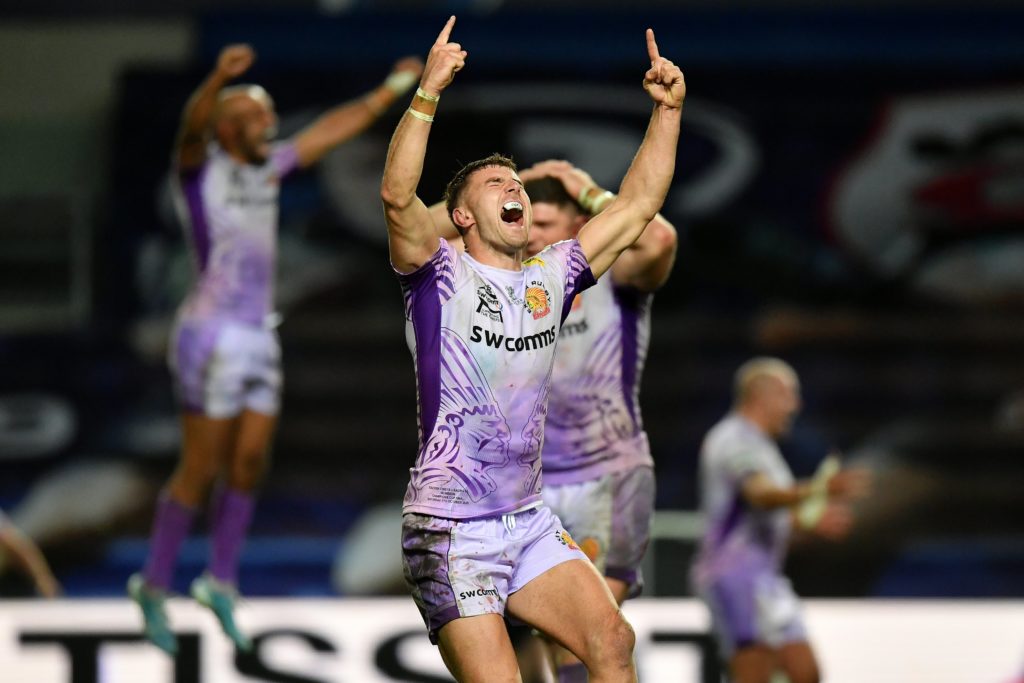
Profits from the 2018-19 season will give Northampton, Bath, Bristol, Leicester and Exeter a headstart over their rivals in fending off the loss of revenue in the short term, whereas Wasps will hope to depend on previous revenue made by the Ricoh Arena, as they have done since their move in 2014. Clubs such as Sale and Harlequins, who continued to make significant losses during the 2018-19 season, are set to struggle more than others.
With wage bills remaining consistently high and turnover plummeting, top-flight clubs will need to depend on investments to stay out of trouble. In April 2019, the private equity and investment advisory firm CVC Capital partners acquired a 27 per cent shareholding in Premiership Rugby for £220m, giving each club roughly £17m each. The new relationship with CVC will prove to be an important one given the size of the financial challenges ahead.
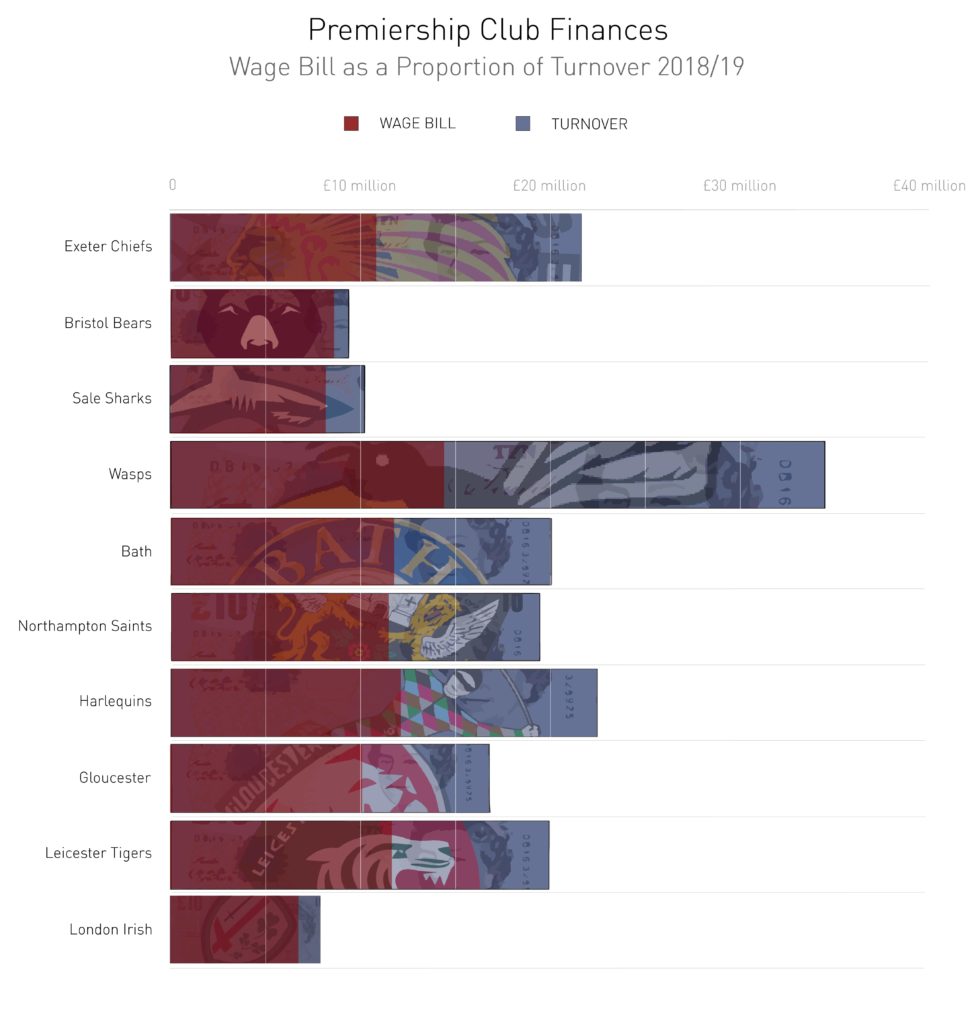
Club breakdown
Up-to-date accounts for Worcester and Saracens have not yet been published.
Exeter Chiefs
Turnover 2018-19: £21.7million
Wage bill 2018-19: £10.7million
Profit 2018-19: £1.6million
The only Premiership club to have made a profit in both the 2017-18 and 2018-19 financial years, Exeter fans will hope that their record of sustainable management will go some way towards dampening the impact of the coronavirus on the club’s finances. Champions Cup winners and in the Gallagher Premiership final, the Chiefs have had a phenomenal season and their success has come with one of the lowest wage bills in the league. Club director Tony Rowe points out in the club’s most recent strategic report that “Sandy Park welcomed a record average number of spectators” during the 2018-19 financial year, signifying that the club are set to grow further when fans return to the stadium.
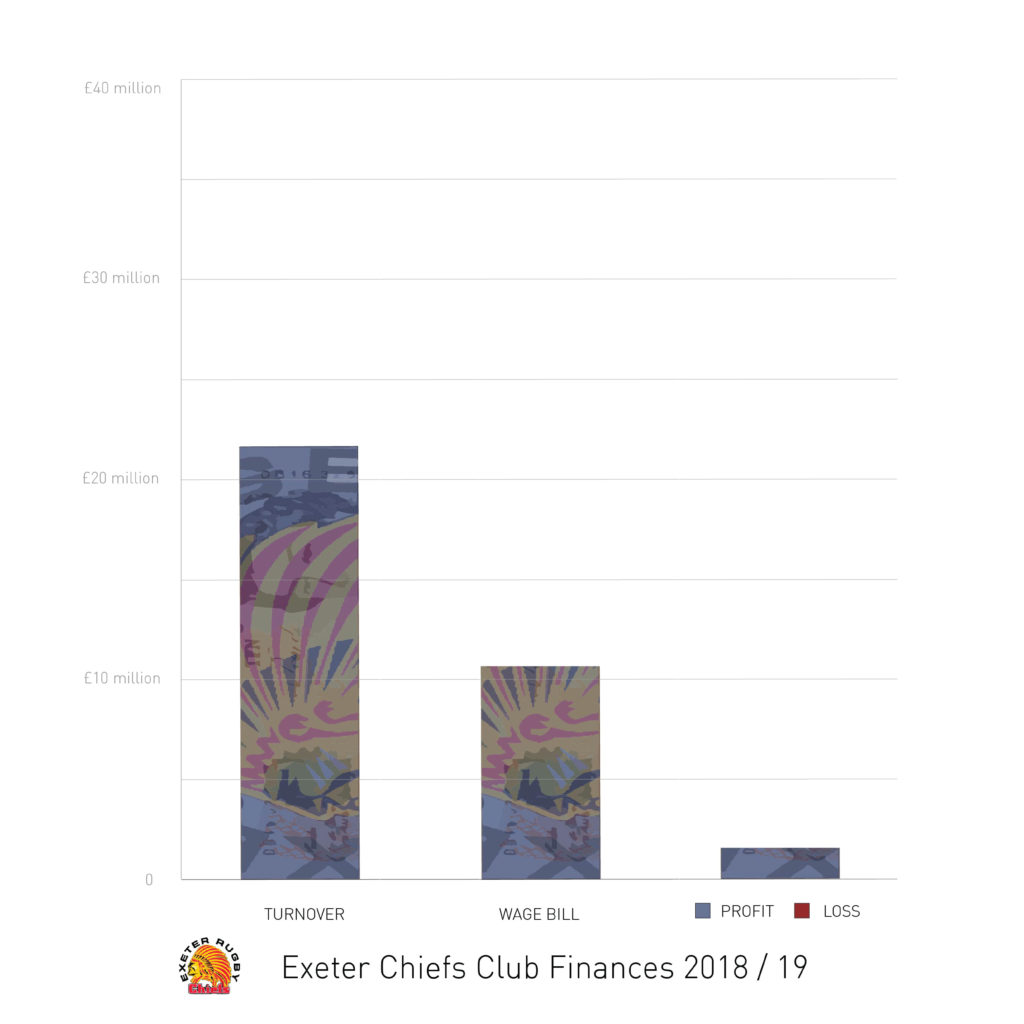
Bristol Bears
Turnover 2018-19: £9.4million
Wage bill 2018-19: £8.6million
Profit 2018-19: £1.8million
The Bears were Challenge Cup winners and Premiership semi-finalists – and those results are matched by an equally impressive financial record. Finishing the 2017-18 financial year with £7.2million in losses must have been difficult to stomach, even for Bristol’s billionaire owner Stephen Lansdowne and his wife Catherine, who manage the club through Lansdowne’s company Pula Sports Ltd, which also controls Bristol City Football Club. Throughout the 2018-19, Bristol increased their turnover by more than £4m and finished with £1.8m in profits. Whilst this is a remarkable feat, Bristol fans will hope that their owner is prepared to take on more losses over the next few seasons.
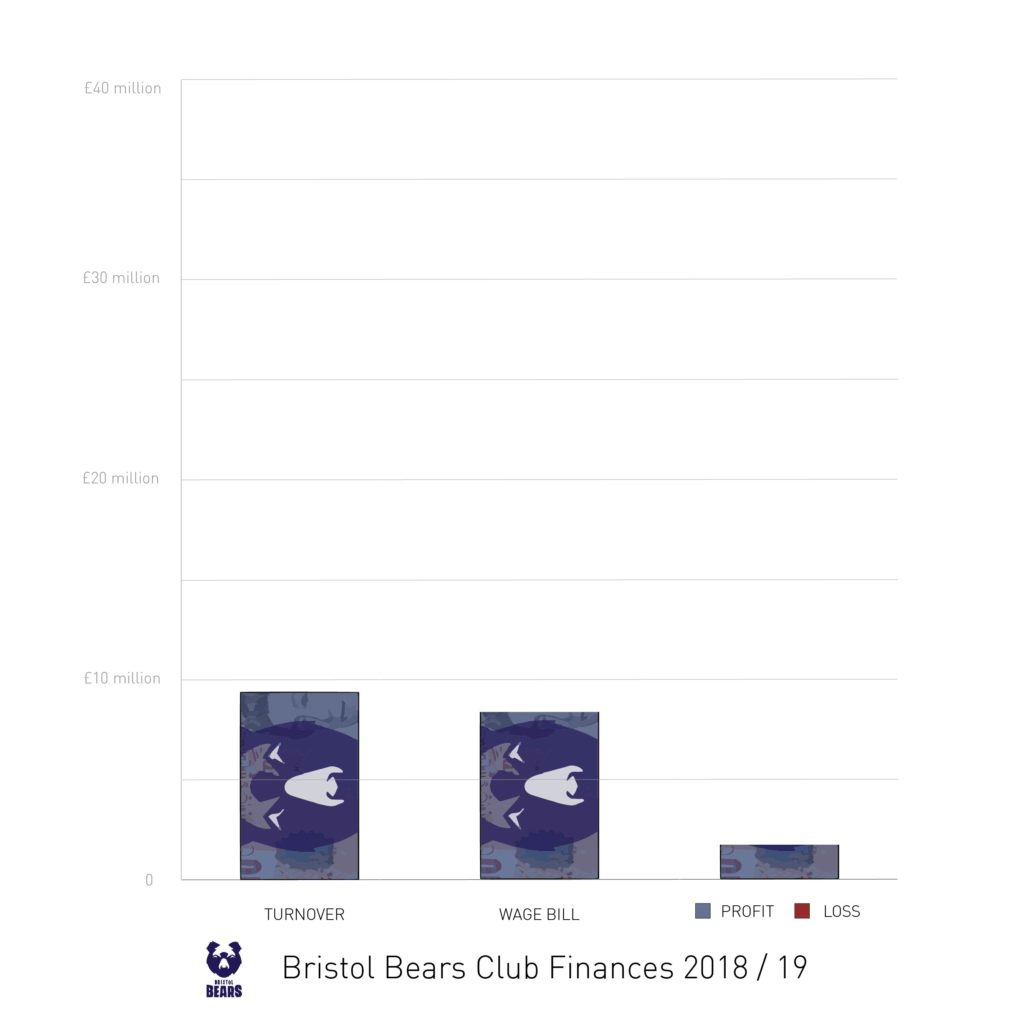
Sale Sharks
Turnover 2018-19: £10.3million
Wage bill 2018-19: £8.3million
Loss 2018-19: £3.5million
Despite their promising league position this season, Sale owner Simon Orange has reason to feel uneasy about the future of the Sharks. Their accounts suggest that the club almost doubled their 2017-18 loss of £1.8m to further accrue £3.5m in losses during the 2018-19 financial year. Whilst efforts to keep the wage bill as low as possible are proving successful, Sale rank among the lowest clubs in terms of turnover. Fans are better pre-occupying themselves with the return of a fit-again Manu Tuilagi rather than fretting over the poor financial health of their club.
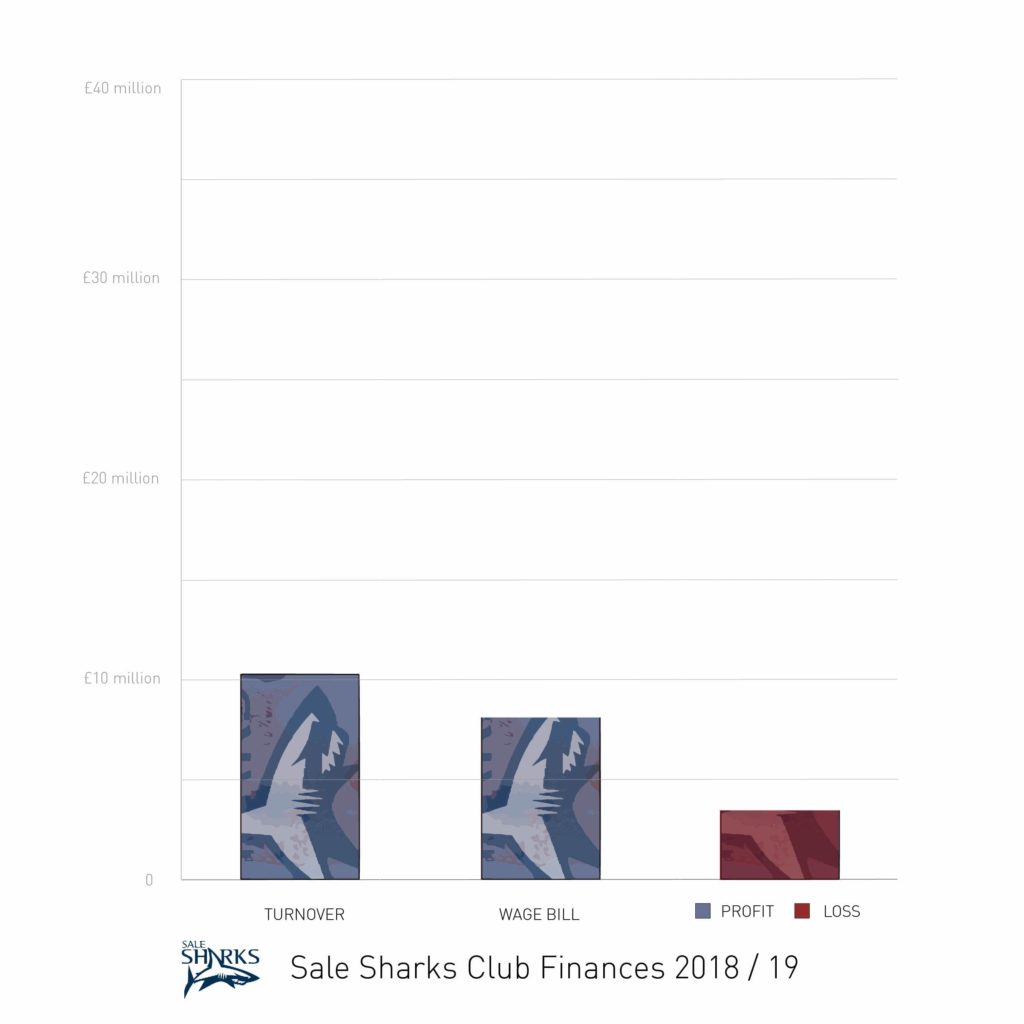
Wasps
Turnover 2018-19: £34.5million
Wage bill 2018-19: £14.3million
Profit 2018-19: £3.6million
Although alienating some of the club’s fanbase, Wasps controversial move to Coventry’s Ricoh arena in 2014 was justified from a business perspective. Able to rely on income from concerts and events taking place at the stadium, there is certainly more of a financial safety net where Wasps are concerned in comparison to some of the other Premiership clubs. The evidence rests in the fact that the club were able to turn around enormous losses of £9.7m in 2017-18 to finish the 2018-19 financial year with £3.5m in profit. But with the division’s highest wage bill, it is apparent that Wasps are unafraid to spend big to attract talents like Brad Shields and Malakai Fekitoa. They might have to tighten their belts for now.
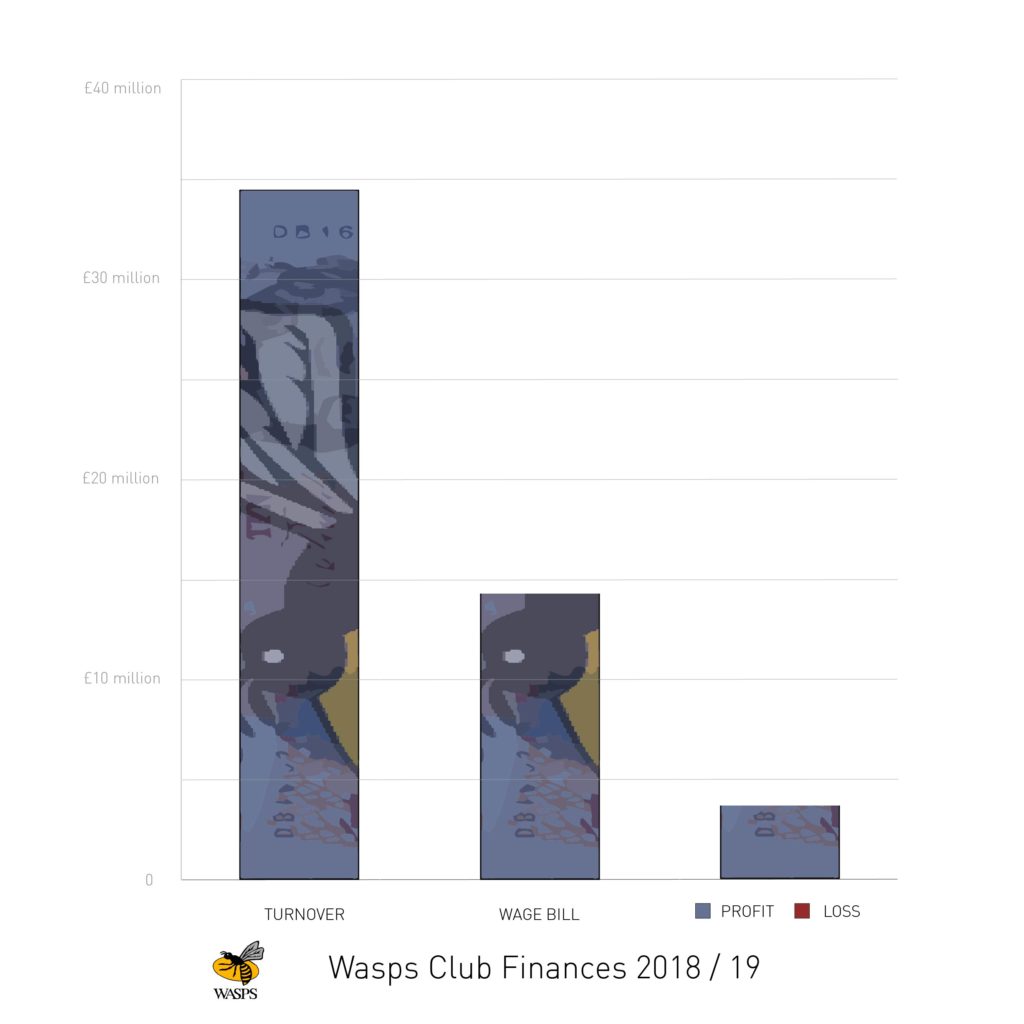
Bath
Turnover 2018-19: £20.1million
Wage Bill 2018-19: £11.7million
Profit 2018-19: £5.6million
Bath are set to be one of the clubs most disappointed by the loss of income whilst coronavirus restrictions remain in place. Bruce Craig and Lars McDonald, company director and managing director respectively, managed to finish the 2018-19 financial year with the highest recorded profit of any Premiership club.A profit of £5.6m was reported, which is in stark contrast to the previous year’s report, where Bath recorded a loss of £3.1m. The directors will hope more than most for ‘normal’ action to safely resume as soon as possible so that they can build on the financial position that they were in before the lockdown.
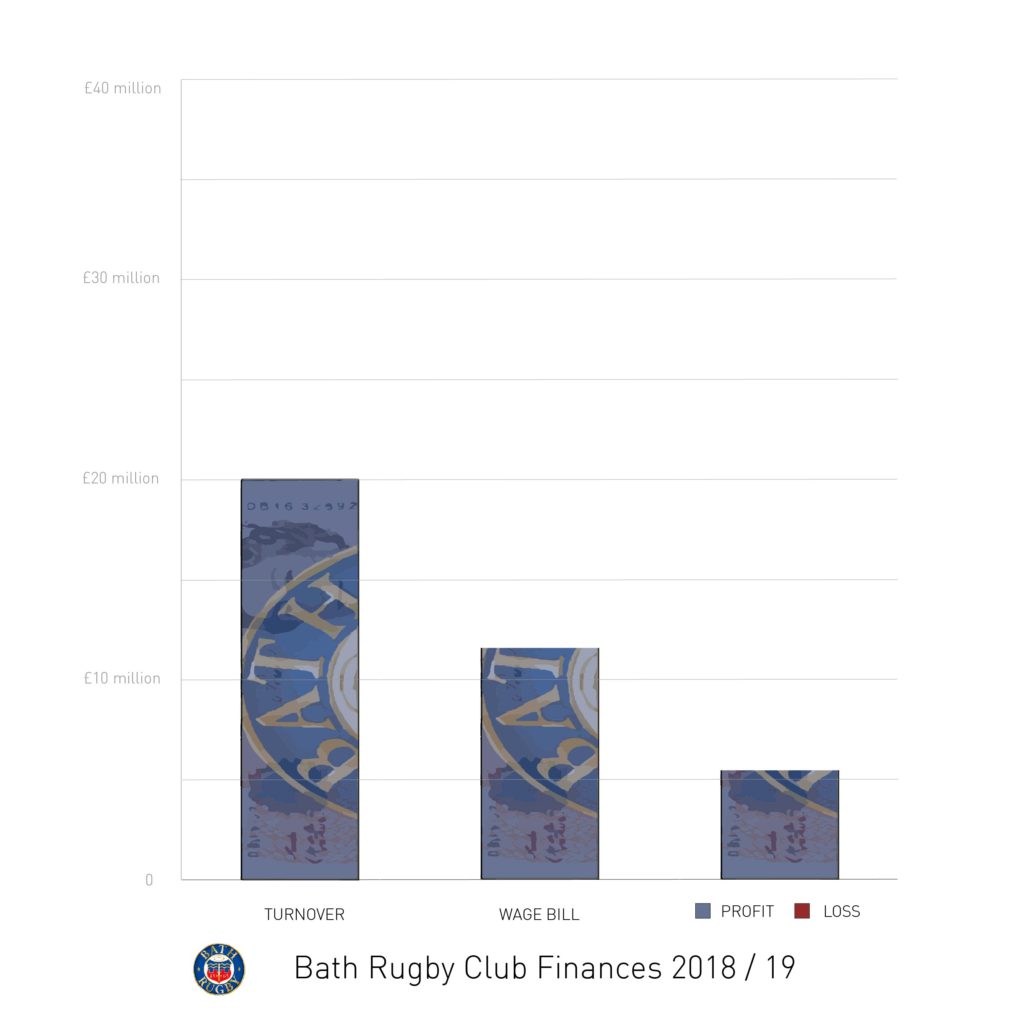
Northampton Saints
Turnover 2018-19: £19.4million
Wage bill 2018-19: £11.6million
Profit 2018-19: £4.3million
In a lengthy statement to open the Saints’ most recent annual report, chairman John White was careful to point out that the club are “operating in a very difficult financial environment” and that they should not “rest on their laurels”. Northampton were another of the Premiership clubs who were able to turn loss into profit between 2017 and 2019 and finished the 2018-19 financial year with a significant uptick of £4.3m, fourth to Bath, Gloucester and Leicester. With Premiership ticket sales down four per cent between 2017-18 and 2018-19, Northampton will be eager for fans to pour back into Franklin’s Gardens having been deprived of live rugby for months.
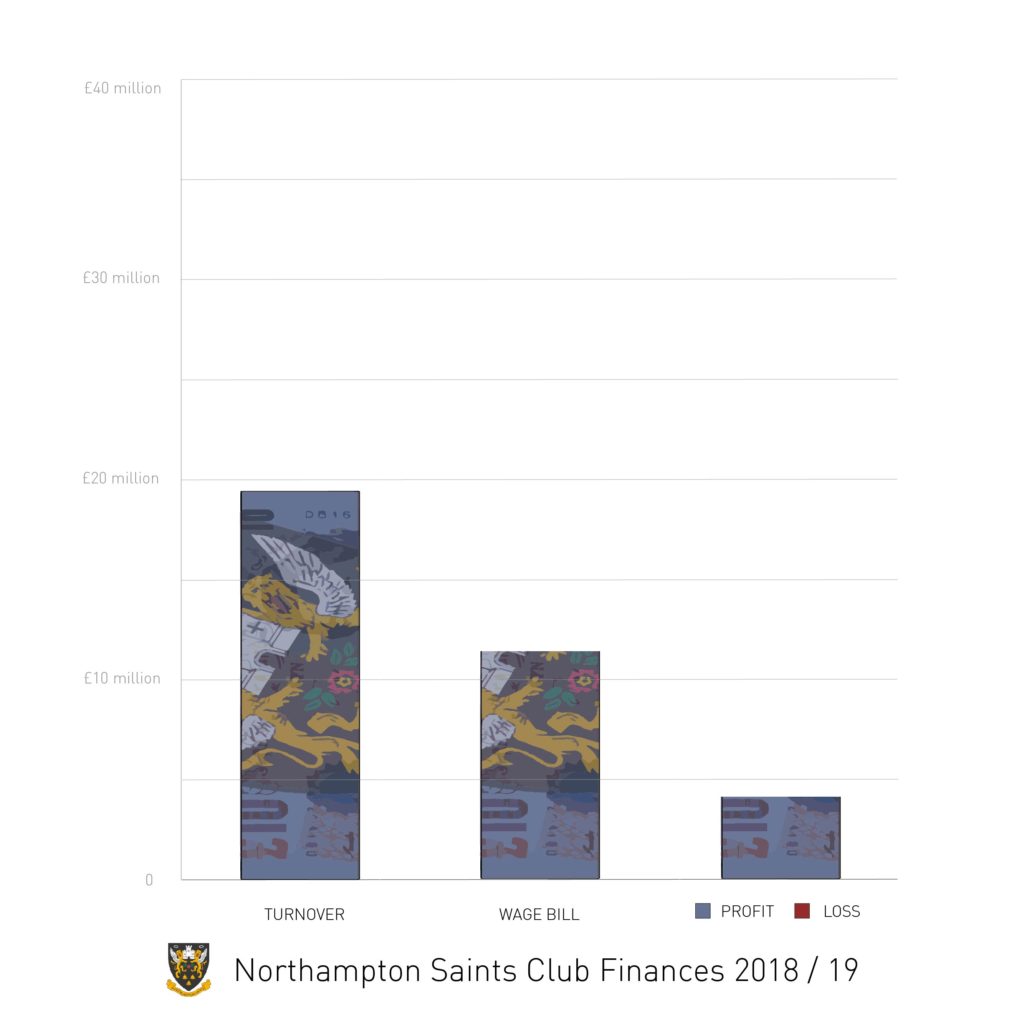
Harlequins
Turnover 2018-19: £22.8million
Wage bill 2018-19: £12million
Loss 2018-19: £6.4million
Suffering losses for the second consecutive season, Harlequins will be hoping that they can depend on the sizeable turnover they receive from ticket sales and other matchday income when spectators are allowed back into The Twickenham Stoop. Despite having one of the consistently largest average matchday attendances in the Gallagher Premiership, Quins are still in huge amounts of debt. It is therefore surprising to see that the club have the second highest wage bill in the league. It doesn’t look like Harlequins will become financially self-sustainable any time soon.
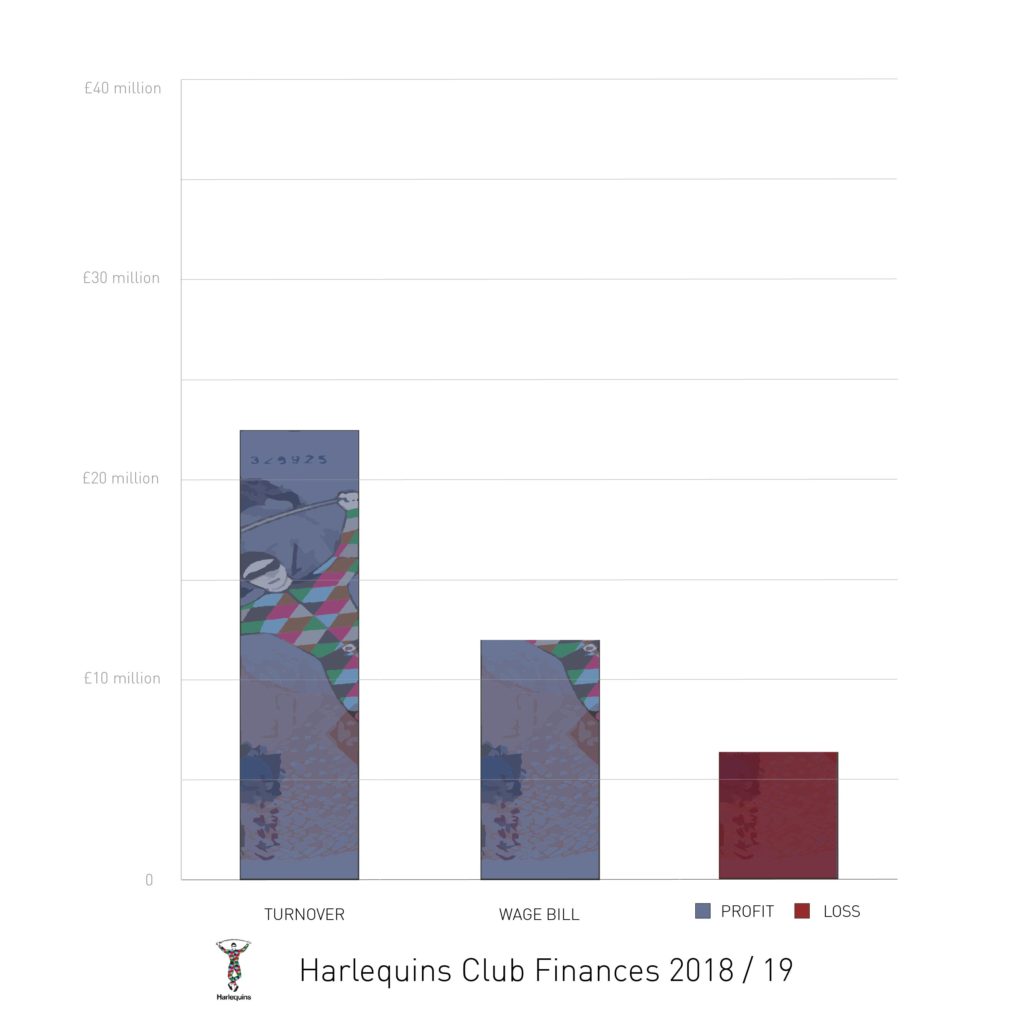
Gloucester
Turnover 2018-19: £16.9million
Wage bill 2018-19: £10.9million
Profit 2018-19: £5.4million
In a similar fashion to Bath, Gloucester managed to turn their accounts around during the 2018-19 season. With losses of £2.1m recorded in 2017-18, Gloucester fans will feel reassured that their club reported profits £5.4m in their most recent annual report. A combination of investments and a steady turnover has helped Gloucester make this recovery, but it will be a challenging time ahead for a club who are only beginning to wrestle control of their finances.
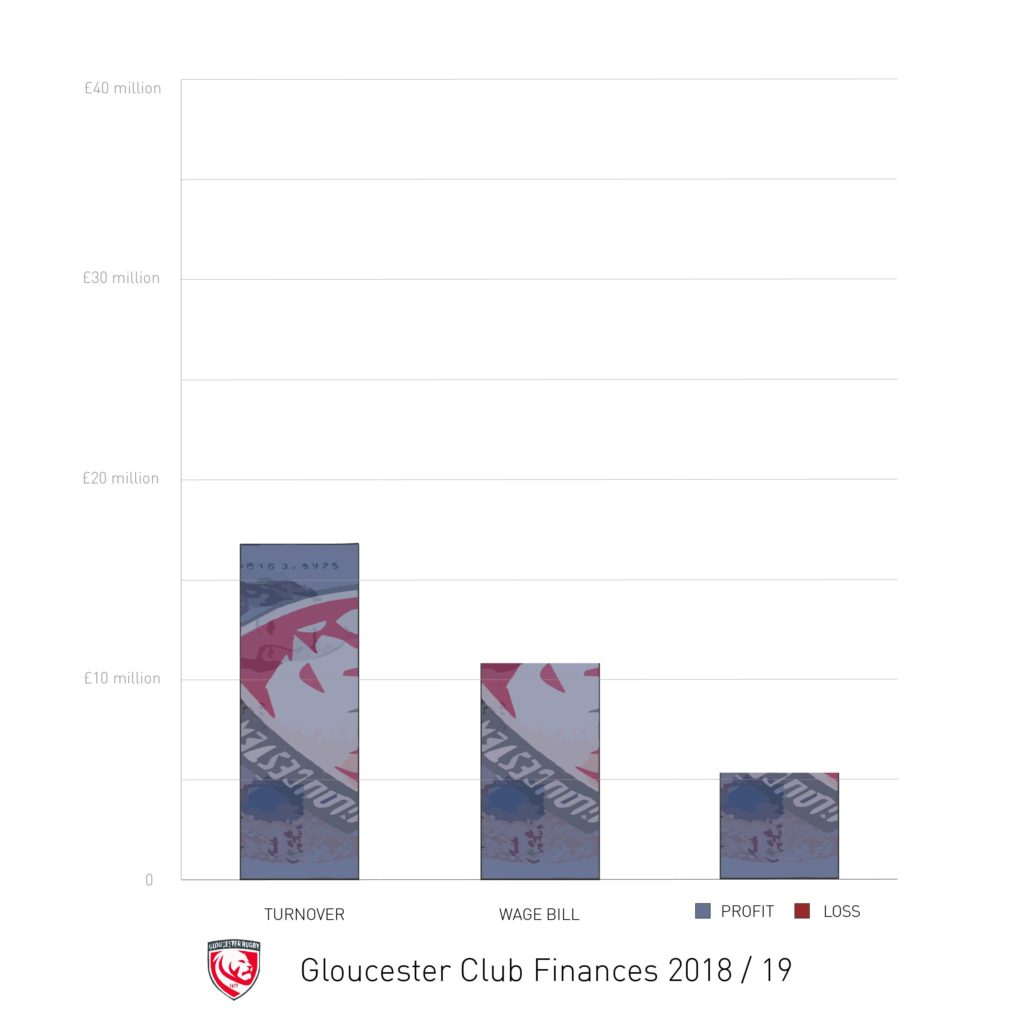
Leicester Tigers
Turnover 2018-19: £20million
Wage bill 2018-19: £11.7million
Profit 2018-19: £5.2million
Although Welford Road is known to be the best-attended stadiums in Premiership Rugby, the Tigers have only just managed to turn their club into a profitable one. Steady growth for Leicester means that in 2018-19 the club were able to report profits of £5.2m, comfortably ranking amongst the most profitable clubs in the Premiership. Turnover at the club is the fourth highest in the league and considering that the Tigers’ wage bill was just more than half of their total turnover for 2018-19, they should have more wiggle room than others to cope with the loss of revenue. The five-year stadium sponsorship provided by Mattioli Woods will have helped balance the books but it didn’t stop 31 members of staff losing their jobs as a result of the pandemic.
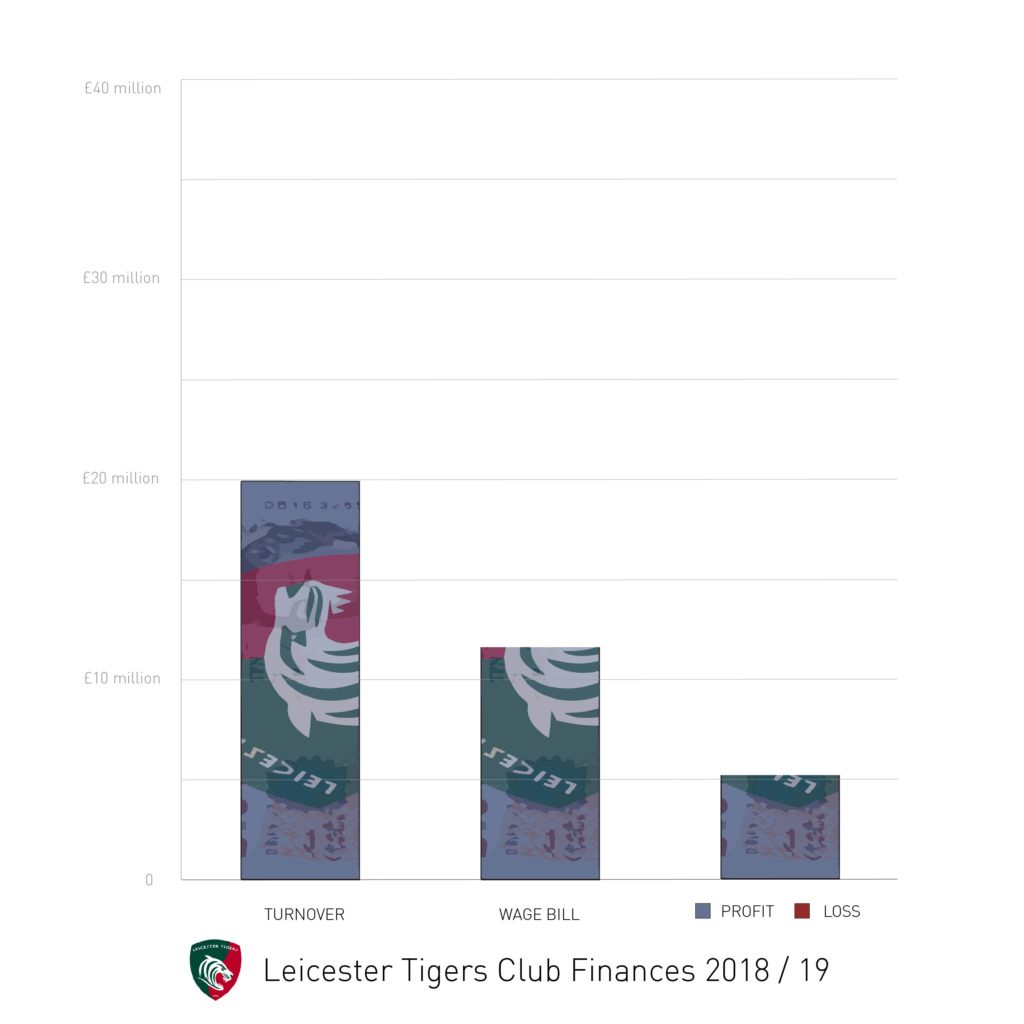
London Irish
Turnover 2018-19: £7.7million
Wage Bill 2018-19: £6.9million
Profit 2018-19: £2.4million
As one of the Premiership’s smallest clubs, it is perhaps unsurprising to see that London Irish posted the lowest turnover in the league. Despite the narrow margin between their wage bill and turnover figures, the club have managed to record a higher profit for 2018-19 than both Bristol Bears and Exeter Chiefs. The cost-cutting decision by Mick Crossan, owner of London Irish, to groundshare with Brentford FC was followed up by an announcement earlier this year that Irish players will take a 25 per cent pay cut. But taking a positive attitude towards the impact of the pandemic on club rugby, Crossan has suggested that the financial crisis could be the sport’s saving grace and encourage other clubs to manage their accounts more sustainably.
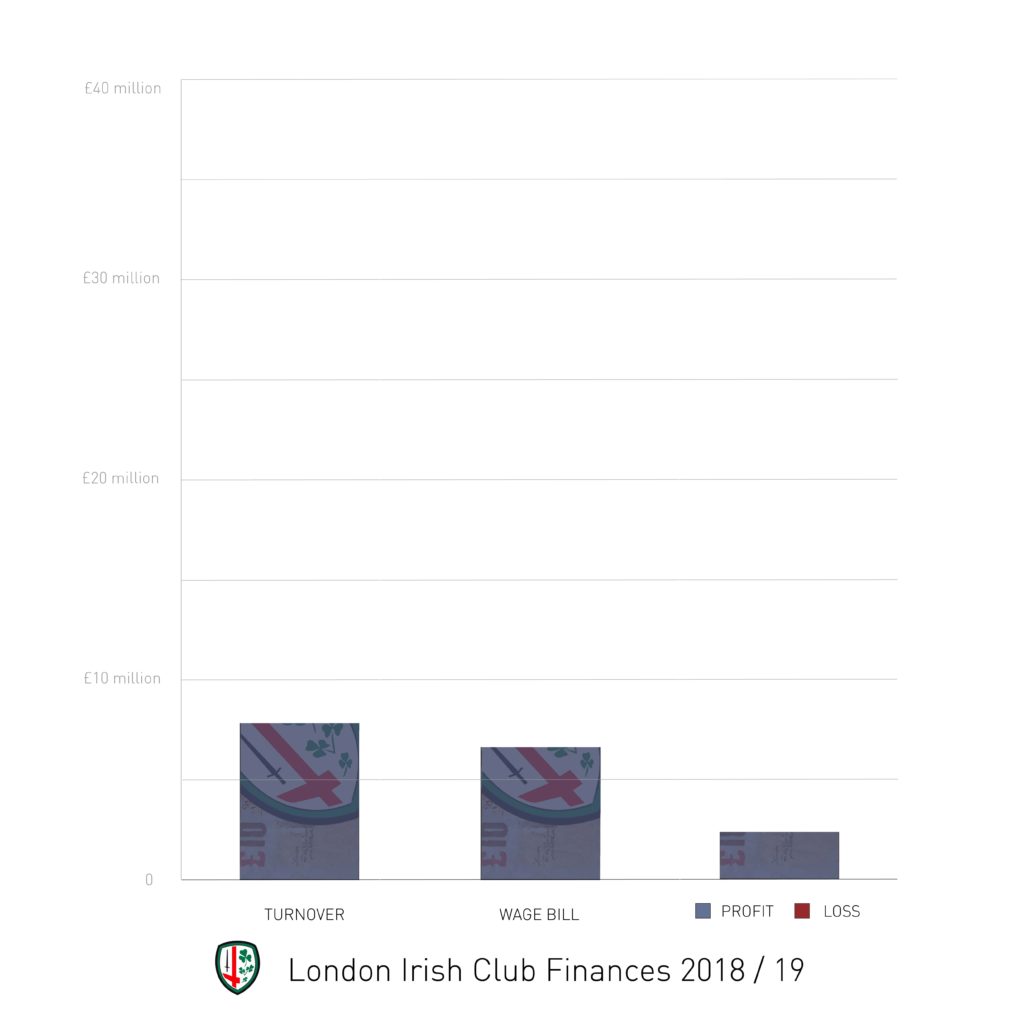
So while Rowe and his fellow Premiership chairmen fret about the clubs’ financial demise, there is still a light at the end of the tunnel. How long it continues to shine, though, remains to be seen.
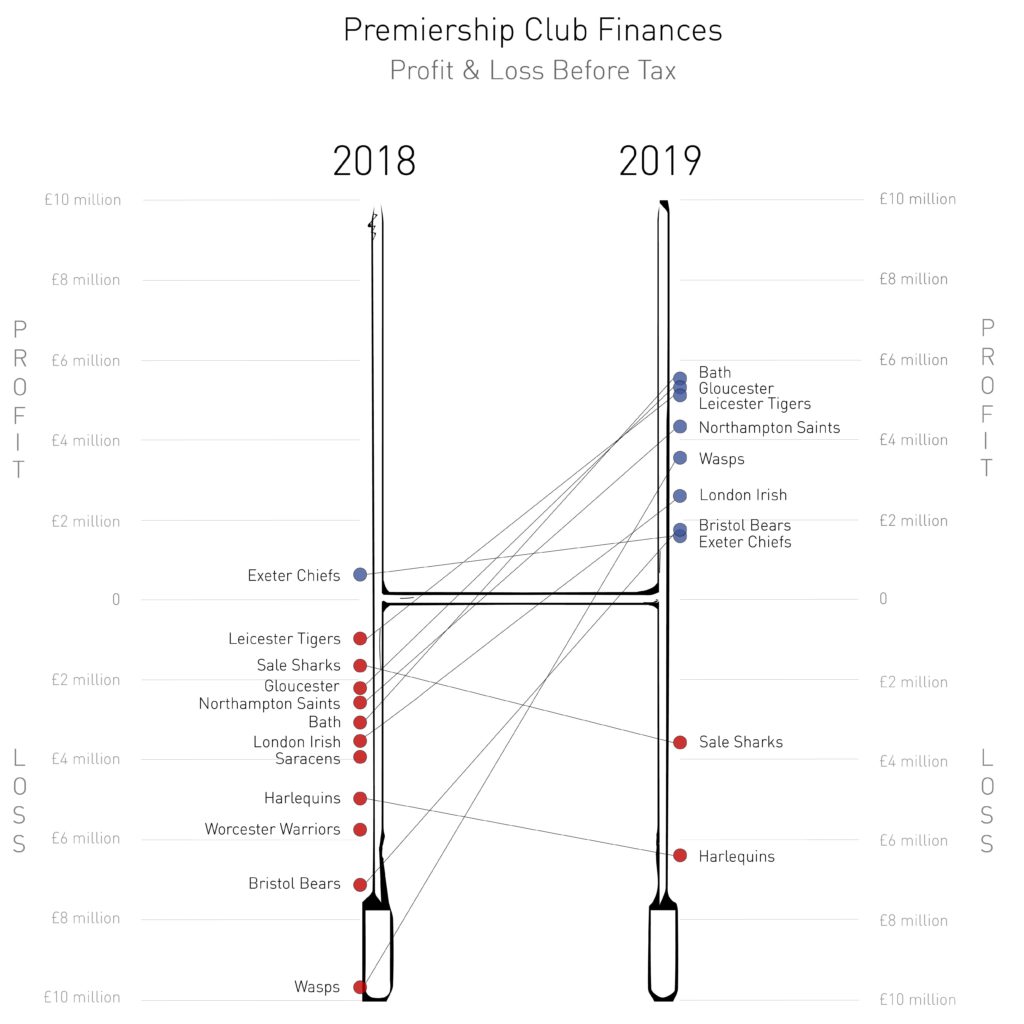
*2017-19 financial accounts for the clubs currently in the Gallagher Premiership. All figures accurate to annual statements from Companies House as reported by the ownership of each individual club. Methods used to calculate turnover figures vary between clubs and may be rounded up or down, meaning that the figures presented may not always tally with the total turnover figure.
More stories
If you’ve enjoyed this article, please share it with friends or on social media. We rely solely on new subscribers to fund high-quality journalism and appreciate you sharing this so we can continue to grow, produce more quality content and support our writers.


Comments
Join free and tell us what you really think!
Sign up for free